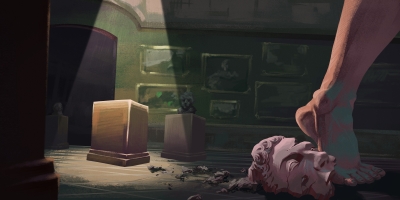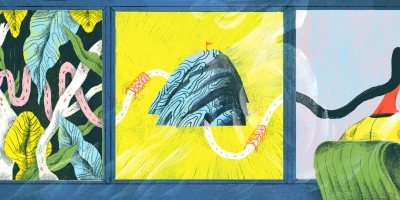Nonfiction
The Laws of Familial Thermodynamics
by Sulagna Misra

7.
Every time I watch a movie or TV show about outer space, my longing for intergalactic travel grows. I feel as if we should be able to escape to another planet by now; maybe that would make the problems of this one less inevitable and more palatable. Sometimes I wonder if I could just fly away—if I could just take the right step and start floating gently upward, released from my gravitational tether. I know I would regret my decision immediately, grabbing fistfuls of grass and clinging to tree branches as I drifted up and away, desperate to prevent my sudden release from Earth.
Growing up surrounded by my family of scientists and talking about the reality of space travel, I should know better. But I’m a writer, not a scientist. I tip more toward “fiction” on the scales of “science-fiction.” Whenever my family and I view science-fictional media together, I learn a little more about the laws of familial thermodynamics: how my relatives’ technical practicality combines with my dreamier sensibilities to make the universe of our family run.
6.
Contact was one of the first movies that carved the yearning for space travel into me. Based on the novel by Carl Sagan, it stars Jodie Foster as an atheist scientist looking for life beyond Earth. My mother once told me that it’s my grandfather’s favorite movie, and I can see why. While the story examines ideas of belief, science, family, and connection, Sagan deftly deploys actual science throughout, unlike most sci-fi movies, which tend to eschew the science for more explosions.
I first saw the movie when I was very young, and there is one moment that has crystallized in my mind perfectly. As Foster’s character witnesses firsthand a bright, swirling cosmic occurrence, she tears up at its quiet magnificence. “Some celestial event. No—no words. No words to describe it,” she says between gasps. “Poetry! They should’ve sent a poet.”
Like curious eyes and incessant worrying, science runs in my family. The grandfather who loves Contact, now eighty-two, was a professor in physics. (I’d argue he still is one, with his wild hair and endless hunger for knowledge, even though he doesn’t lecture anymore.) One of his daughters, my aunt, is a professor in high-energy particle physics at IIT-Delhi, one of the biggest universities in India. They both worked on a paper that laid the groundwork for proving the existence of the Higgs-Boson particle. My mother has a doctorate in physics, and my father is a professor in electrical engineering, which is my brother’s current undergraduate major. My aunt and uncle met while studying electrical engineering together, and another aunt has a master’s degree in biology. Her daughter is becoming a doctor, and her son is studying engineering.
The missing link in my family of scientists is my mother’s mother, who has won national awards in India for her poetry. When I was younger, my mother would tell me, “You’re like her. Sometimes it skips a generation.”
But my mother did not compare me to my grandmother because I wrote poetry. She compared me to her because while I read the books my parents gave me on black holes and DNA, I read many more novels, and at a faster pace. Around the beginning of middle school, I started getting in trouble for reading too much. I would read during lunch, during religious events, when I was supposed to be doing homework, and in the pockets of time in math class when I would finish a worksheet early.
That scene in Contact is probably so memorialized in my mind because it gave me an in: They wanted a poet? They could’ve sent my grandmother. Maybe they could’ve sent me.
5.
If Contact regards science as noble and necessary, The Big Bang Theory does the exact opposite. With its multitude of reused tropes about the awkwardness of nerds, it marries an interest in space (or engineering, or physics) with a confusion about basic human interaction. In my family, it’s the opposite: my scientist parents have a longstanding family-esque friend circle of people who came together while studying in graduate schools oceans and countries away from their homes (mainly sciences, natch). This means several birthday parties and religious events and just plain meet-ups full of these supposedly “awkward nerds” every year, the calendar overflowing with my parents’ geniality and warmth.
My parents don’t really care about The Big Bang Theory, but I take it personally. My problems with the show are threefold: uninspired tropes, a patronizing meanness about nerds, and stereotypes about who can be a scientist. I once complained to my father how Howard—terrible, joke-cracking, leering Howard, of all undeserving people—could go to outer space with only a master’s in engineering. My father, who has master’s degrees in four separate scientific fields, as well as a doctorate in electrical engineering, shrugged and said, “He probably did good research.”
As the non-scientist of the family, I guess my counterpart would be the scientifically illiterate but socially “normal” character Penny. But unlike her, I enjoy science, and I’ve always grappled with the difficulties of being a regular person, thwarted by the dilemmas of making small talk and good friends. While I was not in the same class as my grandmother, I did begin writing poetry in middle school—scores and scores of painful, heartbroken poetry filled with the tangled agony of my existence.
My parents were very proud, if puzzled about what it would come to. They asked me when I would start working on novels, or at least submitting articles to some national publications. I’m not sure if they had delusions of their teenage daughter’s grandeur, or if they were just out of their depth in terms of trying to help me. Despite their intelligence, I would say it was probably both. My perfectionism prevented me from writing too much that I wanted to show them (or anyone else), and we reached an impasse.
4.
Unlike The Big Bang Theory, Futurama is a science-fiction comedy that makes science jokes rather than jokes about scientists. It’s a show about twentysomething delivery boy Philip J. Fry, who gets cryogenically frozen in 1999 and wakes up in the year 3000, and though it takes place on Earth, it involves lots of alien characters and trips to other planets. I was the one who introduced Futurama to my brother, who is seven years younger than I am and studying electrical engineering (of course). The age difference between us means our relationship wavers between advice and reassurance, talking about nothing, and gossiping about our family. Watching weird television is one of the ways we can interact without feeling pressured to do so.
One of the first Futurama episodes we saw together was “The Luck of the Fryrish,” in which Fry learns, to his outrage, that another Philip J. Fry was the first person on Mars. He concludes that his brother Yancy must have stolen his name, his seven-leaf clover, and his dream of space travel after he was frozen. But through a series of flashbacks, we and Fry both learn that Yancy named his son Philip after his brother’s disappearance, encouraging his son to pursue space travel the way his brother never could.
The first time I saw it, I admired the writing. Watching it with my brother, I started sobbing, the emotional resonance thudding almost painfully in my chest. How would I feel if my younger brother disappeared without a trace? Never mind if he got to visit other planets or meet aliens—how would I live without him?
My brother paused the video in the middle of the episode. “Are you okay?”
“YES,” I said, through a curtain of salty tears.
He looked at me with wide eyes. “Are you sure?”
“YEAH, I’M FINE,” I said, struggling to form the words. “YOU CAN PLAY IT.”
We finished the episode with him stealing glances at me as I wiped my snotty nose and teary eyes on my sleeves.
I never explained the tears to my brother, but later, I told my mother how I felt, and she relayed the information to him. We didn’t really discuss it, but my brother and I began to watch Futurama regularly after that.
3.
Gravity was an obvious viewing choice for our family, and we all had something to say afterward. My father delighted in the digital effects, my mom found Sandra Bullock’s temperament unrealistic for an astronaut, and my brother looked up what exactly would happen to a body exposed to outer space. As the resident cultural critic, I pointed out the international implications of the Russian and Chinese space programs within the movie and in terms of real-life global-movie markets.
A few months after we watched it as a family, I went to a special 3-D screening at the Film Society of Lincoln Center, followed by a Q&A session with director Alfonso Cuarón. I asked two questions, because I’m that jerk—one about how he favors female characters, and one that…well: “My parents both have degrees in physics, and they were really impressed with this movie, but you got some stuff wrong, and I was wondering how you actually researched the movie.”
After the snickering laughter died down, Cuarón noted he hadn’t thought of making the main character a man at all, but regarding the second question, he and his son had written the first draft of the movie with, at most, some quickly googled research.
“Then,” he said, “when we started to make the film, the science consultant said we were all wrong.” They scrapped their original script before making a better-researched new one—but that one soon became too bloated with scientific jargon.
“We then went back to the original draft, with more scientific details,” he said. “But, you know, ultimately it is just a movie.”
“What about the astronaut’s diaper?” said the moderator.
“You think you want to see a diaper,” said Cuarón. “But you don’t want to see no diaper in the movie!”
When I relayed the story to my awed family later, my mother was appropriately embarrassed on my behalf: “He is right. Ultimately, it is a movie.”
But that kind of questioning has been my modus operandi ever since my dad accidentally subscribed to Entertainment Weekly when I was in middle school. I love putting a movie into the centrifuge of my brain, separating each cultural element like the disparate parts of a solution. I may not be a scientist, but my analysis aspires to a similar intensity and exactitude. And clearly the scientists I’m related to value the “fi” half of “sci-fi,” too.
2.
On a visit home, I watched Sunshine with my family. It’s about a group of astronauts delivering a nuclear bomb to restart the dying sun—a ridiculous premise, but I was writing an article about the film’s science.
“You know, I thought about studying astrophysics,” said my mother.
“Yeah, you’ve mentioned that,” I said, transfixed with the story.
“I don’t like this movie,” she said before leaving. “It’s all ending very badly.”
My dad had already fallen asleep.
I stayed, transfixed in horror, flinching at each twist and turn. Then I took a long weekend to research and comprehend the theoretical physics behind it, which refuted most of what could happen in the film. After it was published, I sent my parents the article.
“Did you really understand all this?” my father asked.
“I even forgot about all this,” said my mother, referring to the “random walk” photons make between hydrogen nuclei in their path from the core of the sun out to the surface, which can take up to 40,000 years.
“And you got paid for the article?” said my dad.
“Yep,” I said, the brightness of my grin competing with his.
1.
As the media expert at home, I’ve often dictated what movies and TV shows we should watch. That has sometimes meant I’ve been awful to watch anything with.
“This show is so racist,” I’d say while watching something with family. “And why don’t the women get to do more?”
My mom would sigh.
“The basic premise is actually really sexist,” I’d add.
“Can you shut up?” my dad would say affectionately, and I would leave in a huff.
I got far less irritating as the years passed, but it’s been a longstanding argument with my parents that I am too aware of representation and cultural critique of media.
This came to a head when we saw Marvel’s Guardians of the Galaxy as a family during one of my visits home. My dad accepted it as a “time-pass” type of movie, but I was sorely disappointed.
“What did you think of the movie?” I asked my brother, in a voice he knew meant trouble.
“It was fine,” he said, pointedly looking at his phone.
“It was just so sexist,” I said. “Why did he have to call her a slut? Why was the main character a caricature of the white-guy playboy archetype? How come outer space follows the same patriarchal crap as life on Earth?”
“Okay, okay,” my mom said.
“I just can’t believe we paid money to watch that movie.”
“We already watched it,” she said in a long-suffering voice.
I forewent discussing it further, but a version of this argument reappeared soon after while watching another television show. My mom suggested the main actor had been faced with charges of sexual harassment, and while I pointed out she had read incorrectly, my father asked if that even mattered.
“Of course it does,” I said, pointing out that an artist’s morality often shows up in the art they make, the way Guardians of the Galaxy director James Gunn’s twisted sexism shows up in odd moments throughout the movie.
My dad and I had an argument into which every dirty artist’s name was dragged, and which only stopped because it was eleven PM and my dad was sleepy. Later, when I found out about Joaquin Phoenix’s potential casting for the next Marvel movie, I said nothing to him. But I told my mother, “I’m just so sick about caring about this. It’s so tiring, because who even cares? They’re never going to become more diverse. It’s just going to be the same thing over and over again.”
“No,” she said. “It’s good that you care about this. And it’ll change, I promise.”
“Really?” I said, sniffling.
“Yes,” my mother promised, the way only she can. Later, she sent me articles about how several people expected more diversity out of Marvel. I had already read them, but I appreciated the gesture.
0.
For the past couple years, I’ve been working on a draft of a novel with elements of science-fiction. One day, I started badgering my father about specific scientific phenomena I wanted to use in the book. My parents had initially presented me with a fat physics textbook on the particulars of space and time, but asking random questions turned out to be a much more enjoyable method of research.
When my mom found out I was coming to family for research on a novel, she could barely contain her excitement. You know those animations of atoms you see in science specials, trembling with incredible energy? She was kind of like that.
“Tell me all about it,” she said. “And ask us all anything you need to.”





